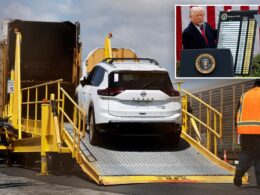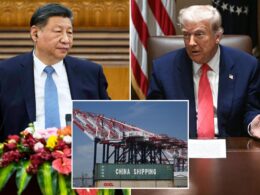President Trump’s escalating, tit-for-tat tariff war with China threatens to upend key US industries — from agriculture and food to planes and semiconductors — risking massive financial losses, downsizings and closures, experts told The Post.
On Wednesday afternoon, Trump raised the tariff on imports from China to 125%, “effective immediately,” after a 104% tariff took effect overnight. The stepped-up China tariff came even as he announced a 90-day pause on taxes for most other nations.
That was after Beijing earlier Wednesday raised its own tax on imports from the US to its own shores to 84% from 34% — saying in a statement, “The US’s practice of escalating tariffs on China is a mistake on top of a mistake.”
Trump’s tariffs on Beijing are an attempt to level the widening trade gap between the countries. China enjoyed a $361 billion surplus over the US in 2024, according to the Financial Times.
However, China’s 84% tax could send costs catastrophically soaring for US retail, electronics, automotive and semiconductor firms, like Boeing and Coca-Cola, which are major exporters to the Mainland, making them less competitive in a substantial market.
“US exporters will be priced out of key markets overnight,” warned David Warrick, executive vice president at Overhaul, a supply chain risk management company.
Under the levy, which is set to take effect on Thursday, these companies should expect to face higher input costs, compressed margins, production delays and weaker demand — all of which could significantly hit second-quarter earnings this year, Warrick told The Post.
“An 84% retaliatory tariff from China is not just symbolic — it’s commercially punishing,” Warrick said in a note.
Planes, automobiles and motorcycles
Boeing will be among the hardest hit US companies, since the aerospace giant already has significant plane deliveries lined up with Chinese airlines.
Air China, China Eastern Airlines and China Southern Airlines — the nation’s top three airlines — have agreements to take delivery of 45, 53 and 81 Boeing planes, respectively, over the next two years.
Those deals could fall through if China’s import tax makes rivals Airbus and Commercial Aircraft Corporation of China more appealing.
Boeing is already struggling in the market. Its sales and deliveries plunged in China after two fatal plane crashes in 2018 and 2019.
Planes, however, take a lot longer to manufacture than clothing or food products, which gives Boeing a buffer period to adjust its supply chain or wait for tariffs to be negotiated lower, Warrick told The Post.
Detroit’s Big Three, forced to eat extra tariff-related costs, could be swayed to pause production, lay off workers or even shutter factories.
“Sure, Chinese-made cars rule their home market, but this is still bad news for our automakers, including Ford and GM,” Brandon Daniels, CEO at AI supply chain firm Exiger, told The Post.
To avoid closing factories or laying off workers, US companies “either have to sell more domestically, or you have to find another international market which is going to compensate for whatever those losses are due to the Chinese tariffs,” Warrick said.
Harley-Davidson also might soon regret its all-American image after attempting to make in-roads in China.
The struggling motorcycle brand suffered an 18% drop in its Asian markets in 2024 compared to the previous year, according to trade site Powersports Business.
Food and agriculture
The US agricultural industry is expected to be another sector that faces steep losses, since China is a major market for the industry — taking in more than $27 billion of US agricultural goods last year, according to the Department of Agriculture.
China imported more than $1 billion each of cotton, sorghum, beef, pork and seafood from the US last year, according to the government data.
In particular, US soybean farmers will lose out on a huge market. China imported nearly $13 billion worth of US soybeans last year, according to the USDA.
During the 2018 trade war, under Trump’s first administration, US soybean farmers lost a chunk of their market share in China to Brazilian exporters, who are expected to benefit once more, The American Soybean Association told The New York Times.
Experts told The Post they anticipate popular US candies and soda will also be heavily impacted by China’s tariffs.
Coca-Cola, with its $300 billion market cap, has a major footprint in China. Last year, the company amassed $3.25 billion in sales, according to Swire, Coke’s bottling partner on the Mainland.
The soda giant, along with other major food companies like Hershey — which operates facilities across Pennsylvania, Tennessee, Virginia and Arizona — may already have some inventory stockpiled in China, which can help them delay price hikes.
But waning demand and increased competition will eventually force companies to raise prices for Chinese consumers, according to Hitha Herzog, chief retail analyst at H Squared Research and part-time faculty at Parsons.
“These confections and condiments are considered discretionary purchases and are in some ways price agnostic, meaning manufacturers can raise prices a bit and not attrition a lot of customers,” Herzog told The Post.
“But since these companies are dealing with inflation, a decrease in demand, tariffs and retaliatory tariffs, they might not have a choice than to either increase prices dramatically or impose layoffs,” she added.
Semiconductors
China is also a major importer of chips — taking in $10 billion worth each year. About $8 billion of these are central processing units assembled by Intel in the US, according to Bernstein analysts.
Last year, the nation was Intel’s largest market, accounting for 29% of revenue.
Micron, a US memory chipmaker, could also get hurt, since some of its chips sold in China are imported from the US. The company also has facilities in China and other countries, though.
Nvidia’s artificial intelligence chips will not be impacted by the tariffs.
Though China imports the chips en masse, they are assembled in Taiwan by chip manufacturer TSMC.
Miscellaneous
China’s tariffs could also impact companies like KitchenAid and Crayola, which operate globally but have significant manufacturing in the US, according to Rita McGrath, professor at Columbia Business School.
Though it sells its crayons and colored pencils worldwide, Crayola’s world headquarters is located in Lehigh Valley, Pa., and it operates two major factories in the state. It also outsources some production to Mexico.
KitchenAid, a Michigan-based company known for its popular stand mixers, sells its products around the world.
It has facilities across the US and Canada, and some in China, but it assembles all of its multi-colored mixers at its factory in Greenville, Ohio, according to Durocher’s, a home and appliances retailer that sells KitchenAid products
With Post wires








